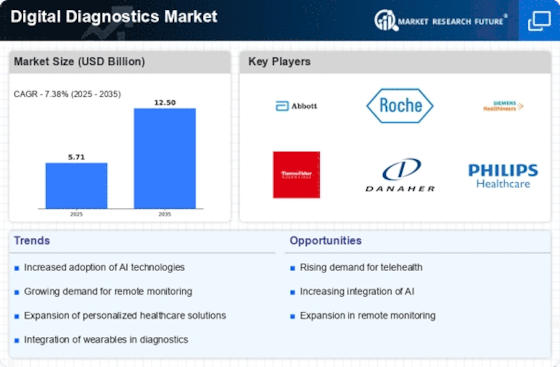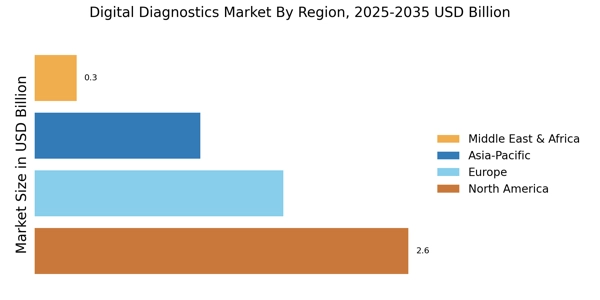Growing Aging Population
The increasing aging population is a critical driver in the Digital Diagnostics Market. As the global demographic landscape shifts, the proportion of elderly individuals is rising, leading to a higher prevalence of chronic diseases that require ongoing monitoring and management. This demographic trend is expected to drive demand for digital diagnostic solutions that cater to the unique health needs of older adults. For instance, the market for digital health solutions targeting the elderly is projected to grow significantly, as these tools facilitate remote monitoring and timely interventions. The Digital Diagnostics Market is poised to capitalize on this trend, as it offers innovative solutions that enhance the quality of care for aging populations, ultimately improving health outcomes and reducing the burden on healthcare systems.
Rising Demand for Remote Monitoring
The increasing demand for remote monitoring solutions is a pivotal driver in the Digital Diagnostics Market. As healthcare systems evolve, there is a notable shift towards patient-centric care, which emphasizes the need for continuous health monitoring. This trend is evidenced by the projected growth of remote patient monitoring devices, which are expected to reach a market size of approximately 2.5 billion USD by 2026. Such devices facilitate timely interventions and enhance patient engagement, thereby improving health outcomes. The Digital Diagnostics Market is likely to benefit from this trend, as remote monitoring tools integrate seamlessly with diagnostic technologies, allowing for real-time data collection and analysis. This integration not only streamlines workflows but also empowers healthcare providers to make informed decisions based on accurate, up-to-date patient information.
Advancements in Diagnostic Technologies
Technological advancements are significantly shaping the Digital Diagnostics Market. Innovations such as next-generation sequencing, point-of-care testing, and advanced imaging techniques are revolutionizing diagnostic capabilities. For instance, the market for point-of-care testing is anticipated to grow at a compound annual growth rate of 10% over the next five years. These advancements enable faster and more accurate diagnoses, which are crucial for effective treatment planning. Furthermore, the integration of artificial intelligence in diagnostic tools enhances the precision of results, thereby reducing the likelihood of misdiagnosis. As these technologies continue to evolve, they are expected to drive the Digital Diagnostics Market forward, fostering a more efficient healthcare ecosystem that prioritizes accuracy and speed.
Increased Focus on Preventive Healthcare
The growing emphasis on preventive healthcare is a significant driver in the Digital Diagnostics Market. As healthcare costs continue to rise, there is a concerted effort to shift from reactive to proactive health management. This shift is reflected in the increasing adoption of diagnostic tools that facilitate early disease detection and management. For example, the market for preventive diagnostics is projected to expand, with a notable increase in the use of genetic testing and biomarker analysis. Such tools empower individuals to take charge of their health, leading to better health outcomes and reduced healthcare expenditures. The Digital Diagnostics Market stands to gain from this trend, as it aligns with the broader movement towards personalized and preventive healthcare solutions.
Regulatory Support and Reimbursement Policies
Regulatory support and favorable reimbursement policies are crucial drivers in the Digital Diagnostics Market. Governments and regulatory bodies are increasingly recognizing the importance of digital diagnostics in enhancing healthcare delivery. This recognition is often accompanied by the establishment of frameworks that facilitate the approval and reimbursement of digital diagnostic tools. For instance, recent policy changes have streamlined the process for obtaining reimbursement for telehealth services, which often include digital diagnostic components. Such supportive measures are likely to encourage innovation and investment in the Digital Diagnostics Market, as companies seek to develop and commercialize new diagnostic solutions that meet regulatory standards. This environment fosters a more robust market, ultimately benefiting patients and healthcare providers alike.


















